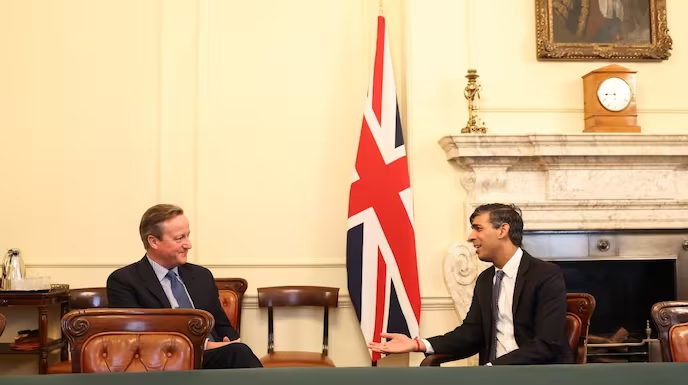On the 13th of November, British Prime Minister Rishi Sunak conducted a second ministerial reshuffle ahead of the anticipated general elections next year. This reshuffle notably saw the former British Prime Minister David Cameron (2010 to 2016) appointed as the new Foreign Secretary, succeeding James Cleverly. Cleverly, in turn, took on the role of Home Secretary, replacing Suella Braverman, who was dismissed after her article triggered strong reactions. In her article, Braverman criticized the British police, alleging they showed strictness towards right-wing protesters while displaying leniency towards pro-Palestinian demonstrators.
Critical Issues
Cameron’s assumption of the British Foreign Ministry, seven years after leaving official duties, prompts questions about the continuity and evolution of British foreign policy toward the Middle East in the upcoming period. This occurs at a time when Israel intensifies its military operations in the Gaza Strip, and regional and international apprehensions rise regarding its potential escalation into a regional conflict, particularly amid heightened military clashes in other fronts, notably Lebanon. The primary regional issues that will shape Cameron’s diplomatic agenda include:
- Coordinating with Washington in Crisis Management: In his inaugural tweet on “X” following his appointment as Foreign Secretary, Cameron emphasized his commitment to supporting allies and strengthening partnerships in addressing a wide range of international challenges faced by Britain. This encompasses the Russian-Ukrainian war and the ongoing crisis in the Middle East. This suggests an increased level of British-American coordination under Cameron’s leadership in dealing with crises and challenges in the Middle East region.
In his initial communications after assuming his new position, Cameron engaged in discussions with his American counterpart, Antony Blinken, on November 13th, regarding the ongoing crisis in the Middle East. The early indications of British-American coordination became evident as Washington and London jointly imposed sanctions on elements of the Hamas movement to erode its influence within Palestinian territories and isolate it on the international stage.
- Reaffirmation of the Two-State Solution Principle: Despite Cameron’s endorsement of Israel’s right to self-defense in the aftermath of ‘Operation Guardian of the Walls’ on October 7th and its military operations against Hamas, characterized as ‘terrorist’ by the new Home Secretary, the British Foreign Secretary will underscore that the two-state solution is the most fitting option to bring an end to the reciprocal military escalation between Israel and Palestinian factions.
During his leadership of the British government, Cameron collaborated with the United States and the international community to champion the two-state solution. In March 2015, Cameron urged then-Israeli Prime Minister Benjamin Netanyahu to actively pursue a two-state solution with the Palestinians, asserting that a negotiated settlement leading to the establishment of a Palestinian state is the singular path to achieving enduring peace in the region. Cameron consistently called for exerting pressure on both Palestinian and Israeli parties to ensure the sustained negotiation of this principle.\
- Advocating for a Humanitarian Ceasefire in Gaza: The British government has issued appeals to all parties to permit the necessary humanitarian ceasefire, enabling the delivery of additional aid to the Gaza Strip. This stance is in tandem with the Israeli forces’ call to operate within the bounds of international law and cease ‘extremist acts of violence’ in the West Bank. Cameron declared on November 14th that the United Kingdom stands in solidarity with the besieged Palestinian people, urging all parties to consent to a humanitarian ceasefire to facilitate the entrance of life-saving assistance into Gaza.
The issue of declaring a ‘humanitarian ceasefire,’ pushed by the United States to facilitate the delivery of humanitarian aid to civilians in Gaza, was one of the topics discussed by Cameron and his American counterpart during their initial telephone conversation. This discussion arises amidst the escalating human toll of Israeli military operations in the Gaza Strip since October 8th.
- Elevated Engagement in the War on Terrorism: Throughout his leadership of the British government, Cameron emerged as a staunch advocate for deploying British military might to counter terrorist organizations in the Middle East, notably the “ISIS” group that held sway over extensive territories in Iraq and Syria. He had previously cautioned European nations about the potential emergence of an extremist state along the shores of the Mediterranean if the terrorist organization succeeded in establishing its proclaimed caliphate.
Cameron’s administration actively supported the expansion of airstrikes in Syria and Iraq against the organization. As a result, the matter of combating terrorism and assisting regional nations in their endeavors to eradicate terrorist entities is anticipated to occupy a prominent position on Cameron’s agenda, featuring prominently in his subsequent engagements with various officials from the region. This is particularly relevant for countries still grappling with the scourge of terrorism, despite the diminished influence of both “ISIS” and “Al-Qaeda” in the area.
- Forging a Free Trade Agreement with the Gulf Cooperation Council: Britain is increasingly prioritizing negotiations with the Gulf Cooperation Council (GCC) countries to establish a free trade agreement following its exit from the European Union. This aligns with the nation’s broader strategy to secure trade deals with global partners. Leveraging his past experience, Cameron is expected to play a pivotal role in advancing towards an agreement that would significantly reduce or eliminate customs tariffs on British exports to GCC nations.
Limits of Change
On November 13th, the spokesperson for the British Prime Minister underscored that the new Foreign Secretary is committed to the current government’s approach towards global challenges, including issues related to China and conflicts in the Middle East. It was emphasized that there is a mutual agreement between the Prime Minister and the Foreign Secretary to uphold the existing British government stance concerning Israeli military operations in Gaza.
Nevertheless, Cameron, drawing from his extensive eleven-year political experience, stands poised to deftly navigate the global challenges confronting Britain and the Middle East. His approach will aim to strike a delicate balance between his robust support for Israel, a stance shared by the majority of British politicians, and advocating for the delivery of humanitarian aid to civilians in the Gaza Strip. This becomes especially critical amidst the mounting domestic discontent in Britain due to the escalating human toll of the Israeli conflict in Gaza, a situation previously characterized by Cameron as a ‘detention camp.’
Leveraging both his political acumen and the personal relationships cultivated during his leadership of the British government, Cameron seeks to reassert Britain’s influence in the Middle East. This initiative responds to recent discussions among British politicians and officials highlighting a perceived waning of Britain’s influence in the region, attributed to the erosion of its soft power. There is a call for a renewed focus on the Middle East, reclaiming attention after a pronounced shift towards the Indo-Pacific region, with a special emphasis on the Gulf Cooperation Council countries currently undergoing a transformative shift in business dynamics—an opportune moment for British companies to thrive.


